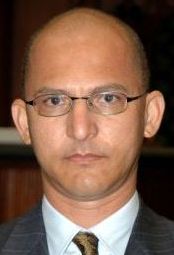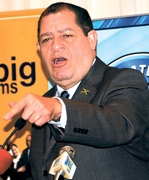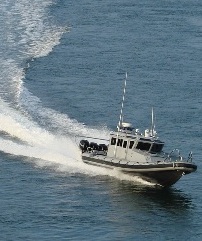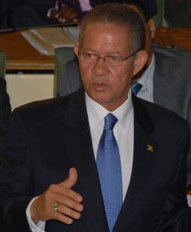Archive for October 15th, 2009

LA approves FS’ last budget
 (CNS): The 2009/10 budget has passed through the Legislative Assembly with the backing of government members and the House’s independent representative. However, the $700 million spending plan was not approved by the opposition, who all abstained when the leader of government business asked for a division. Financial Secretary Kenneth Jefferson’s final budget has seen a raft of fee increases and is forecast to bring in entire public sector earnings of $733,949. With few spending cuts, however, government expenses together with losses from statutory authorities will leave a surplus of less than $5 million.
(CNS): The 2009/10 budget has passed through the Legislative Assembly with the backing of government members and the House’s independent representative. However, the $700 million spending plan was not approved by the opposition, who all abstained when the leader of government business asked for a division. Financial Secretary Kenneth Jefferson’s final budget has seen a raft of fee increases and is forecast to bring in entire public sector earnings of $733,949. With few spending cuts, however, government expenses together with losses from statutory authorities will leave a surplus of less than $5 million.
Following the dramatic fall in government earnings last year, coming at a time when it had increased borrowing significantly to fund capital projects, the 2008/09 fiscal year ended with a $81million deficit. This meant Cayman had broken the rules of its own public management and finance law, forcing government to seek approval from the UK to borrow money to keep government afloat. With the UK pressing for a broader tax base, the request was denied until the government came up with revenue raising measures for this year, a promise to broaden the tax base for the future, as well as plans to control public spending.
As a result of the UK’s pressure to introduce direct taxation of some kind, the government made the decision to push for a surplus budget by raising fees across the board, from banks to work permits, to get back within the confines of the PMFL and eliminate the need for UK approval on borrowing and resist the pressure for property or payroll taxes.
The budget was criticized by both the opposition and the North Side member for raising fees but making very few cuts to public spending. The opposition said government had placed too heavy a burden on the community by aiming to remove the deficit in one year during a recession and it was overly optimistic.
Althoughthe budget did not introduce direct taxation, the increases include a rise in duty, work permit fees, many financial service fee increases, a money transfer fee (on money firms, not banks) and a new business premises fee on commercial tenants. The revenue raising measures are expected to bring government a further $94 million in this budget year and around $126 million over the course of the next twelve months.
The government will also be borrowing $275 million in this budget year to fund capital projects and pay off previous loans. According to the budget document, the entire public sector debt stands at over $714million.

Woman faces home intruder on Walkers Road
(CNS): A man dressed in black, with his face covered, entered a property on Fountain Court, Walkers Road, last night where a young woman was home alone, police have said. While the RCIPS has described the incident as a burglary, they report that nothing was stolen but that the intruder and the victim “engaged in a short struggle”, after which the suspectfled the scene, direction unknown. CNS has asked if the struggle was initiated by the suspect or the victim and is waiting for a response.
The RCIPS report that on 14 October at approximately 7:30pm the 911 Emergency Communications Centre received a call from a woman stating that her friend had just been the victim of a burglary. The victim apparently did not require medical attention. Officers from the Criminal Investigation Department continue their investigations.
Anyone who was in the Walkers Road area around this time and may have seen this man who was clad in full black is asked to contact George Town Police Station CID on 949-222 or they can leave information on an anonymous voicemail service by calling 949-7777 or they can call Crime Stoppers on 800-8477 (TIPS). All persons calling Crime Stoppers remain anonymous, and are eligible for a reward of up to $1000, should their information lead to an arrest or recovery of property/drugs.

Family disappointed over murder trial outcome
 (CNS): The acquittal of Josue Carillo Perez for the murder of Canadian National Martin (Marty) Gareau has come as a disappointment to his family, the Canadian Press has reported. In response to the not guilty verdict handed down on Tuesday by Justice Roy Anderson, who said the prosecution had not proved its case, Claudette Radic, Gareau’s cousin, said she was hoping that the police had finally got the fellow. Following the verdict the RCIPS said that the police will be reviewing the evidence in the case but at this time there are no other suspects.
(CNS): The acquittal of Josue Carillo Perez for the murder of Canadian National Martin (Marty) Gareau has come as a disappointment to his family, the Canadian Press has reported. In response to the not guilty verdict handed down on Tuesday by Justice Roy Anderson, who said the prosecution had not proved its case, Claudette Radic, Gareau’s cousin, said she was hoping that the police had finally got the fellow. Following the verdict the RCIPS said that the police will be reviewing the evidence in the case but at this time there are no other suspects.
"I just wish them luck. I hope that it doesn’t go (on as an) unsolved case forever and ever," Radic told the media in Canada, saying she was disappointed that the only man accused in her cousin’s death was set free. Radic said she expected Perez would be set free because he repeated throughout the trial that he was Gareau’s close friend.
Gareau’s father told the Canadian media that losing his son "hurts so much" that he didn’t want to comment about the trial’s outcome.
The badly beaten body of Gareau was discovered in his Beach Bay home in May of 2008 by his cousins, Gille and Guy Langlois, who had gone to his home after he failed to turn up for work. Before moving to the Cayman Islands in 2004, the 47 year old Gareau used to live in Prince Albert, Sask.
Perez, who claimed to be a friend of the victim during the trial, was arrested in June 2008 when two finger prints found at the scene came up as a match for the Honduran national. However, Perez’s defence attorney, Anthony Akiwumi, argued that his client’s prints were there as a result of innocent contamination as Perez had been a guest in Gareau’s home for dinner only a few weeks before the murder.

Mac defends legal aid cut
 (CNS): The leader of government business has said that the country should not have to pay for expensive lawyers to get “criminals off the hook”. Defending his decision to alter the legal aid policy by sanctioning a legal aid clinic and taking the budget from the courts, McKeeva Bush said the issue of legal aid had been a matter of contention for years, and while the system of jurisprudence might say everybody deserves a fair trial, nowhere does it say the country should pay for it. “I don’t believe the country should may millions of dollars for heinous crimes committed against them,” Bush said on Rooster’s Crosstalk on Thursday morning.
(CNS): The leader of government business has said that the country should not have to pay for expensive lawyers to get “criminals off the hook”. Defending his decision to alter the legal aid policy by sanctioning a legal aid clinic and taking the budget from the courts, McKeeva Bush said the issue of legal aid had been a matter of contention for years, and while the system of jurisprudence might say everybody deserves a fair trial, nowhere does it say the country should pay for it. “I don’t believe the country should may millions of dollars for heinous crimes committed against them,” Bush said on Rooster’s Crosstalk on Thursday morning.
“But of course, it is all wound up in the law and democracy so we spend money on it when we can’t pay for our children or for the handicapped,” he said and added that he was no longer prepared to vote money for lawyers to defend people “who shoot up our children”.
Taking what has long been a populous position that criminals do not deserve to be financed by the state to defend themselves against charges, Bush said the legal aid clinic presented a way for his government to address the original budget allocation of $1.8 million requested by the chief justice, which he did not want to fund.
He admitted that when he made the decision he had not consulted either the CJ or the AG as they were off island but had discussed it with Mrs Catcho from the courts and the solicitor general, Cheryl Richards, who Bush said both backed the idea.
The LoGB further justified his decision when he said both the CJ and the AG had contributed to the reports on the issue from the Law Reform Commission and in public that the legal aid system needed to be addressed. Bush said that the criticisms from the opposition were unfounded and that his ministry would not decided who did and did not get legal aid.
Steve McField, who will be partnering with Theresa Lewis-Pitcairn to create the clinic, said the allocation of legal aid would be means tested and that, based on people’s salary and property ownership, the clinic would administer advice and representation. McField also sought to answer some of the questions that have arisen since the surprise announcement of the policy change late in the LA on Monday night, which the opposition criticised because of the way it was presented in Finance Committee hampering proper debate and a lack of information.
The clinic, McField said, would be employing at least seven qualified attorneys who would be paid salaries. It would have one QC on staff and would also employ paralegals, support staff and train young lawyers. He said the legal aid office would offer a wide range of services as well as defending those facing criminal charges. McField explained that people would be able to go to the clinic for advice on everything from landlord and employer problems to protection from gender violence. The clinic would be available to the community at large but especially to the poor and those who had nowhere to turn.
With a budget of $500,000 for the remainder of this year, increasing to $1.2 million for next, it is apparent the clinic is intended to do far more for far less. McField did not indicate if there would be other sources of funding, whether those using the services would be asked to contribute toward their legal costs within their means, or how they would manage to make a smaller budget do more.
Pitcairn indicated that the clinic would be unlikely to seek pro-bono assistance from the legal community as she said the Cayman Law Society had recently rejected the idea of what it called “compulsory charity”. She said that, in its contribution to the Law Reform Commission’s work, it had said that the provision of adequate access to legal aid is a cost to be borne by government and the whole society, not the legal profession, which she noted made it clear where the legal fraternity in Cayman stood.
McField confirmed that the clinic would now be advertising for lawyers to join and they would be asking people they knew if they would be interested.
Currently there are around 10 local defence attorneys that take up what is a busy criminal legal aid schedule. Some are employed by local law firms and paid a salary directly by their employer, who in turn collects the legal aid hourly rate for the work that those salaried lawyers undertake. As legal aid is paid at $135 per hour regardless of whether it is a QC or junior counse,l it does not usually cover the actual costs, meaning some firms at least are still subsidising the legal aid budget.
Local legal firm Walkers for many years employed a criminal defence attorney purely to undertake legal aid work at a loss to the office, which it has recently closed down as it said it wanted to divert the money it gives back to society to different causes. There are other defence attorneys, however, that survive solely on the $135 hourly rate and it is unclear whether the clinic will be seeking to recruit these individuals or whether they will contract their services.
Nor has it yet been explained when the clinic will begin taking over the defence work of the courts. With a number of major criminal trials still in the pipe line, it is not clear if those cases will remain in the hands of their current attorneys and be paid from the $300,000 in the CJ’s remaining allocation, or if they will be turned over to the new clinic’s attorneys.

Local franchise awarded
 (CNS): A young Caymanian entrepreneur, Lucy Georgakopoulos Tibbetts (left), will be heading up a local franchise of Mail Boxes Etc., which will offer the full range of MBE services, including full-service expert packaging, shipping through UPS, FedEx, DHL and its popular US Address e-commerce fulfillment services, private mailbox services, mail receiving and forwarding, packaging supplies, digital quality black-and-white and color copying and other document finishing solutions. The first MBE Centre is expected to open in November 2009 in Camana Bay.
(CNS): A young Caymanian entrepreneur, Lucy Georgakopoulos Tibbetts (left), will be heading up a local franchise of Mail Boxes Etc., which will offer the full range of MBE services, including full-service expert packaging, shipping through UPS, FedEx, DHL and its popular US Address e-commerce fulfillment services, private mailbox services, mail receiving and forwarding, packaging supplies, digital quality black-and-white and color copying and other document finishing solutions. The first MBE Centre is expected to open in November 2009 in Camana Bay.
Gershan A. Major, Chief Executive Officer & Managing Director of MBE – Caribbean, said in a release from the MBE, “I am extremely pleased with the execution of the Franchise Agreement in the Cayman Islands. I believe that we have made the right choice in our Franchisee selection, as the Principal – Lucy Georgakopoulos Tibbetts and her business partners represent the present generation of striving and visionary Caymanian entrepreneurs, with a clear understanding of the market and the needs of the consumer.”
The MBE Centre in Camana Bay will create additional job opportunities and provide a further boost to the Cayman Islands economy in the area of e-commerce, pack and ship, fulfillment and one-stop business support services.
“We are very excited and humbled at being chosen to bring such a credible and long-standing global brand to the Cayman Islands,” says Tibbetts, who is Managing Director of Mail Boxes Etc. – Cayman. “Our team’s business philosophy is to offer excellent value for money by providing reliable and convenient services to our residential and business customers.”
Mail Boxes Etc. says their mission is to make business easier worldwide through their service and distribution network, and to deliver personalized and convenient business solutions with world-class customer service.

Jamaica looks to IMF for help
 (Jamaica Observer): Finance Minister Audley Shaw yesterday pointed to a just uncovered $21-million fraud allegedly committed by an employee in his ministry over the past five years, a US$1.3-billion fall-out from the economic recession, and years of unsustainable borrowing as among the factors responsible for an inevitable return to a borrowing relationship with the International Monetary Fund (IMF).At the same time, Shaw warned that his government would not be acknowledging any ‘sacred cows’ as the country draws nearer to an agreement with the IMF, adding that the discussions with the lending agency had reached a critical stage.
(Jamaica Observer): Finance Minister Audley Shaw yesterday pointed to a just uncovered $21-million fraud allegedly committed by an employee in his ministry over the past five years, a US$1.3-billion fall-out from the economic recession, and years of unsustainable borrowing as among the factors responsible for an inevitable return to a borrowing relationship with the International Monetary Fund (IMF).At the same time, Shaw warned that his government would not be acknowledging any ‘sacred cows’ as the country draws nearer to an agreement with the IMF, adding that the discussions with the lending agency had reached a critical stage.

Customs officers to get guns
 (CNS): An amendment to the Customs Law (2007 Revision) has paved the way for customs officers to carry firearms but only in limited circumstances. According to the change those officers involved in joint operations with the RCIPS will, with the permission of the Commissioner of Police be allowed to carry a weapon when they go out on the operation. The amendment was brought to the Legislative Assembly on Wednesday by Financial Secretary Kenneth Jefferson,who said that customs officers were now more frequently involved in dangerous interdiction duties.
(CNS): An amendment to the Customs Law (2007 Revision) has paved the way for customs officers to carry firearms but only in limited circumstances. According to the change those officers involved in joint operations with the RCIPS will, with the permission of the Commissioner of Police be allowed to carry a weapon when they go out on the operation. The amendment was brought to the Legislative Assembly on Wednesday by Financial Secretary Kenneth Jefferson,who said that customs officers were now more frequently involved in dangerous interdiction duties.
Jefferson told the House that the Immigration Law was recently amended to allow those officers to carry weapons when they work with the police, and this amendment would now provide the same protection for customs officers when carrying out duties on a police operation.
He said that under everyday circumstances the officers would not be carrying weapons and this was restricted to joint RCIPS assignments only, and only when permitted by the commissioner.
The original proposal was even more restricted as it proposed to limit officers to carry weapons only on RCIPS marine unit operations. However, during a debate on the floor of the LA both independent MLA for North Side, Ezzard Miller, and Leader of the Opposition Kurt Tibbetts noted that the way things were going in Cayman with regards crime it would not be long before the officers may well be asked to join land operations as well as those at sea. The MLAs suggested it would be better to have provision in the law now to ensure they would be able to carry weapons in those circumstances as well.
Tibbetts said the move was better late than never as he had championed the cause and had argued with the ‘official’ arm of government in the past over it. However, the opposition leader said it should not be at the permission of the commissioner of police but by permission of the collector of customs. Tibbetts said he believed that was problematic as the senior officers are generally from the UK and very reluctant to let anyone carry weapons. He noted that even with the passage of this amendment it would be possible for the commissioner to prevent customs officers from being able to protect themselves.
“Surely the collector of customs should be in a position to make the judgement call for his officers to be armed.” Tibbetts said. He noted that the nature of the custom officers’ job meant that they are guarding the borders more than the police. As a result he suggested that the customs officers should also be allowed to carry weapons when they are involved in their own operations, regardless of whether they are conducted along with the RCIPS or not. Tibbetts added that he was not suggesting the officers should “be like buster crab”, but he felt they should be allowed to protect themselves as at present sometimes they are going out without so much as a pair of handcuffs.
The amendment was passed with the inclusion of land based police operations, but government did not alter the amendment to provide for the collector of customs to have the authority over arming his officers or for customs officers on duties outside of police operations to be armed.

Golding says no gay marriage
 (AFP): Jamaican Prime Minister Bruce Golding said the country’s parliament would not recognize same-sex marriage while he was in power. "I make no apology in saying decisively and emphatically that the government of Jamaica remains irrevocably opposed to the recognition, legitimization or acceptance of same-sex marriages or same-sex unions," Golding said on Tuesday. The prime minister was opening parliamentary debate on a major proposed amendment to the constitution which would lay out the scope of rights and freedoms for Jamaicans.
(AFP): Jamaican Prime Minister Bruce Golding said the country’s parliament would not recognize same-sex marriage while he was in power. "I make no apology in saying decisively and emphatically that the government of Jamaica remains irrevocably opposed to the recognition, legitimization or acceptance of same-sex marriages or same-sex unions," Golding said on Tuesday. The prime minister was opening parliamentary debate on a major proposed amendment to the constitution which would lay out the scope of rights and freedoms for Jamaicans.